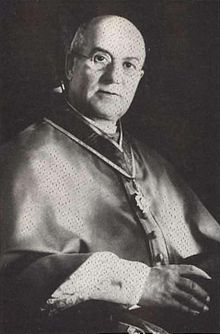Max Kottmann
Max Kottmann (baptized name Maximilian ) (born June 16, 1867 in Sotzenhausen, Schelklingen parish ; † March 22, 1948 in Rottenburg am Neckar ) was a German philologist , Catholic priest, cathedral dean and vicar general of the Rottenburg-Stuttgart diocese .
origin
Kottmann was born in the small hamlet of Sotzenhausen near Schelklingen, which consists of two farms. His father Joseph Kottmann was a farmer on one of the farms and married Wilhelmine, née Zoller. Even as a boy, Kottmann showed an extraordinary talent, so that he took private Latin lessons with the Schelklingen parish vicar Josef Fuchs.
school
His knowledge was already so extensive that he was able to enter the fourth grade at the grammar school in Ehingen . After he had also skipped the 5th grade, he immediately entered the upper secondary school and the Konvikt Ehingen .
Studies: more of a philologist than a theologian
In 1886 he enrolled at the University of Tübingen in the subjects of Catholic theology and classical philology. As a student of Catholic theology, he was a pupil of the Wilhelmsstift . Kottmann therefore completed a double degree. He completed his university days with a doctorate in philology (Dr. phil.). Then Kottmann entered the Rottenburg seminary . There he was ordained a priest on July 15, 1891 .
High school professor
Kottmann took his first professional steps mainly as a teacher. In 1891/92 he worked as a pastor in Isny. In 1892 he became the prefectural administrator in Munderkingen. In 1892 he was the director of the Latin school in Rottenburg am Neckar for half a year, but then returned to Munderkingen to take a two-year leave of absence as a teacher training candidate and to prepare for the professorship examination. After passing his exams, he was appointed Preceptor's Administrator in Riedlingen in 1896. On January 1, 1899, he became chaplain of All Saints and professor at the upper secondary school in Rottweil and, from November 5, 1903, at the same time head of the Rottweiler Konvikt until February 1907.
In the Catholic Church Council
On January 2, 1907, he took over the position of Richard Wahl, who died in 1906, as a member of the Catholic Church Council in Stuttgart. In 1920 Kottmann was appointed to the senior government council. His main area of work was elementary schools. He also represented a large number of other presentations: he was a. a. Advisor for teacher training and teacher examinations and was chairman of the reading book commission for the publication of a new elementary school reading book.
Cathedral dean and vicar general
The Bishop of Rottenburg-Stuttgart Paul Wilhelm von Keppler offered Kottmann in 1924 to join the Rottenburg cathedral chapter as a cathedral chaplain. Kottmann accepted this offer. After Bishop Keppler died in 1926, his successor in office, Bishop Joannes Baptista Sproll , appointed Kottmann vicar general of the diocese. In 1927, Kottmann gave Paul Rißler permission to publish ancient Jewish literature outside the Bible. The preface bows to the religion of Judaism: The Jewish religion was of wonderful spiritual fertility. Had she given the world the Old Testament alone, her fame and service to mankind would be secured for all time ... These non-canonical writings of Judaism [... are] ... important for the study of the Old and New Testament as well as contemporary New Testament history. They are of great help in Bible exegesis. Some are downright oldest biblical commentaries.
The seizure of power by the National Socialists in 1933 brought `` critical times '' ( August Hagen ) for the diocese. Bishop Sproll was an opponent of the regime. When he did not vote on April 10, 1938 for the annexation of Austria, he was expelled from office. As his deputy, Kottmann headed the diocese until Bishop Sproll was able to return to his diocese on June 13, 1945 after the end of the war.
Kottmann was already 78 years old in 1945, but still in office. As a representative of the churches in 1946 he was a member of the Provisional People's Representation for Württemberg-Baden . After the '' Catholic-theological faculty '' had awarded him an honorary theological doctorate (Dr. theol In 1946 he received honorary citizenship from his hometown Schelklingen and in 1947 from the city of Rottenburg am Neckar. In 1947, Kottmann was also made an honorary senator of the University of Tübingen.
A little later, Vicar General Kottmann died on March 22, 1948 in Rottenburg and was buried in the cemetery in Sülchen , the burial place of the Rottenburg bishops.
literature
- Walter Gaus: The Rottweiler Konvikt and its pupils between 1824 and 1924 . Vol. 1: [ representation ]. Ostfildern: Thorbecke, 2014, pp. 123–125 (Kottmann's curriculum vitae in tabular form).
- August Hagen: Max Kottmann 1867–1948 . In: Ders .: Figures from Swabian Catholicism. Fourth part . Stuttgart: Schwabenverlag, 1963, pp. 111-130.
Newly published and provided with additional images as:
- Wilhelm Lederer (Ed.): D. Dr. Maximilian Kottmann: A figure of Swabian Catholicism 1867–1948 . Schelklingen: Stadtarchiv, 1981. (= Schelklinger Hefte, No. 4)
Individual evidence
- ↑ For his work in Rottweil, see Gaus 2014, pp. 123–125.
- ↑ Altjüdisches writings outside the Bible - Wikisource. Retrieved February 10, 2018 .
- ↑ Frank-Roland Kühnel: Landtag, MPs and constituencies in Baden-Württemberg 1946 to 2009. Stuttgart 2009, ISBN 978-3-923476-01-5 , p. 209.
| personal data | |
|---|---|
| SURNAME | Kottmann, Max |
| ALTERNATIVE NAMES | Kottmann, Maximilian |
| BRIEF DESCRIPTION | German priest and vicar general |
| DATE OF BIRTH | June 16, 1867 |
| PLACE OF BIRTH | Rogue blades |
| DATE OF DEATH | March 22, 1948 |
| Place of death | Rottenburg am Neckar |
